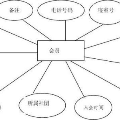
Two of the fundamental no-go theorems of quantum information are the no-cloning theorem (that it is impossible to make copies of general quantum states) and the no-teleportation theorem (the prohibition on sending quantum states over classical channels without pre-shared entanglement). They are known to be equivalent, in the sense that a collection of quantum states is teleportable without entanglement if and only if it is clonable. Our main result suggests that this is not the case when computational efficiency is considered. We give a collection of quantum states and quantum oracles relative to which these states are efficiently clonable but not efficiently teleportable without entanglement. Given that the opposite scenario is impossible (states that can be teleported without entanglement can always trivially be cloned), this gives the most complete quantum oracle separation possible between these two important no-go properties. We additionally study the complexity class $\mathsf{clonableQMA}$, a subset of $\mathsf{QMA}$ whose witnesses are efficiently clonable. As a consequence of our main result, we give a quantum oracle separation between $\mathsf{clonableQMA}$ and the class $\mathsf{QCMA}$, whose witnesses are restricted to classical strings. We also propose a candidate oracle-free promise problem separating these classes. We finally demonstrate an application of clonable-but-not-teleportable states to cryptography, by showing how such states can be used to protect against key exfiltration.
翻译:量子信息中的两个基本不可行定理是不克隆定理(无法制作一般量子态的复制品)和不传送定理(在没有预先共享的纠缠情况下,禁止通过经典信道发送量子态)。据已知它们是等价的,也就是说,如果可以通过传送传递纠缠量子状态而不需要纠缠,则可以进行克隆。我们的主要结果表明,在考虑计算效率时,这种情况并非如此。我们提出了一个关于这些状态和量子Oracle的收集,相对于这些状态而言,这些状态可以被高效地克隆,但在没有纠缠的情况下,不能被高效地传送。考虑到相反的情况是不可能的(可以在没有纠缠的情况下传送的状态可以直接复制),这为这两个重要的不可行属性之间提供了最完整的量子Oracle分离。我们还研究了复制QMA的复杂度类,这是QMA的子集,其证人可以高效地被复制。根据我们的主要结果,我们给出了$\mathsf{clonableQMA}$和限制在经典字符串上的类$\mathsf{QCMA}$之间的量子Oracle分离。我们还提出了一个候选的无Oracle的承诺问题,分离这些类。最后,我们展示了可以应用于加密术的可复制但不可传送的状态,通过展示如何使用这些状态来防止密钥窃取。


